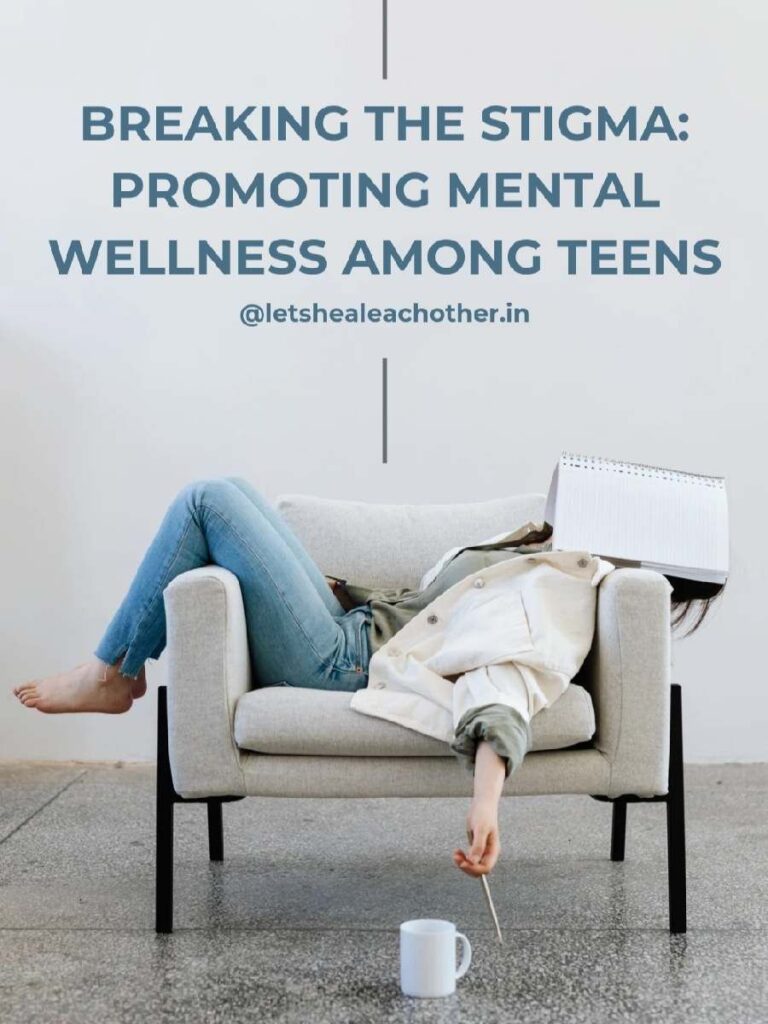
Teen MENTAL HEALTH is a multifaceted and crucial subject that includes anything from commonplace pressures to more severe disorders like sadness and anxiety. Teens are more susceptible to mental health issues during adolescence, a crucial developmental stage marked by quick changes in their physical, emotional, and social aspects.
Teenagers may find it difficult to navigate romantic relationships, and this can have a negative effect on their mental health. This is particularly true when they come across unhealthy dynamics like lust-driven partnerships or relationships built on surface connections. Teens may feel confused, unworthy, and distressed emotionally in such circumstances.
Teens who are in lust-driven relationships may feel hollow or unfulfilled because these relationships are marked by strong sexual attraction without a deeper emotional connection or mutual respect. Similar emotions of betrayal and loneliness can result from phony love relationships, in which one or both partners may not truly care for one another but instead pursue affirmation or status.
Biological changes, such as hormone fluctuations and brain growth, influence teen mental health, as can environmental and social influences such as academic pressure, family dynamics, peer connections, and social media exposure. Additionally, genetic predispositions and past events might influence a teen’s mental health.
Here Are Some Factors Influencing Teen Mental Health:
- Social Media Usage: Spending too much time on social media can cause anxiety, loneliness, and feelings of inadequacy.
- Academic Pressure: Stress and anxiety can be exacerbated by high expectations from peers, parents, or the school.
- Family Dynamics: An adolescent’s mental health may be impacted by conflict or instability in the home.
- Peer Relationships: Self-esteem and mental health can be impacted by bullying, peer pressure, and social dynamics.
- Substance Abuse: Drug and alcohol misuse, whether via experimentation or regular usage, can aggravate mental health conditions.
- Hormonal Changes: Adolescence is a period marked by considerable hormonal changes that can affect behavior and mood.
- Trauma Or Abuse: Past exposure to trauma or abuse may have lingering consequences on one’s mental well-being.
- Genetics: Adolescents who have similar problems are more likely to have a family history of mental illness.
- Socioeconomic Factors: The community setting, lack of resources, and financial stress can all have an effect on mental health.
- Cultural Influences: The expectations and conventions of a given culture can affect how teenagers view and communicate their mental health issues.
Teens need coping strategies and support networks in order to overcome these obstacles. Building resilience can be achieved by using healthy coping mechanisms such as asking for help from responsible adults, learning how to solve problems, exercising, practicing relaxation techniques, and leading a balanced lifestyle that includes enough sleep, a healthy diet, and recreational activities.
- “THE HIDDEN BLESSING OF A COMBUST VENUS” BEYOND PASSION-THE LASTING FLAME OF BURNED VENUS
- THE MOTHER, THE MOON AND THE LORD SHIVA: A SACRED TRIO OF STRENGTH AND SHIELDING
- “WORLD RED CROSS AND RED CRESCENT DAY”
- NATIONAL PET DAY / ARE PETS PART OF OUR SOUL JOURNEY?
- PRAISE IS INEFFECTUAL AND RESPECT IS PARAMOUNT/HOW TO REACT WISELY INSTEAD OF RAGE
Coping Strategies And Support Networks To Help You Navigate Mental Health Challenges
- SELF-AWARENESS entails identifying and reflecting on one’s own emotions, triggers, and reactions, as well as the conditions in which they occur.
- EMOTIONAL REGULATION Deep breathing, mindfulness, and meditation can all help you manage your emotions in a healthy way.
- EFFECTIVE COMMUNICATION It’s essential to communicate ideas simply and concisely. Asking for assistance when necessary is an essential component of effective communication.
- IMAGES CREATIVE using artistic, musical, or literary endeavors as a stress-relieving therapeutic outlet. Teens may express themselves and deal with their feelings in a healthy way thanks to this.
- GLOBAL PERSPECTIVE Redirecting attention from stressful, anxious, and depressing elements of life to more pleasant ones can be facilitated by cultivating gratitude and positive thinking.
- REDUCTIVE STRESS Teens can efficiently regulate their stress levels by practicing relaxation techniques like yoga, deep breathing exercises, or relaxing music.
- RESOLUTION OF PROBLEMS teaching teenagers to recognize problems and come up with answers. and assess the results can enable them to face obstacles with confidence.
- TIME MANAGEMENT Teens can lessen their stress and anxiety by prioritizing their tasks, making realistic goals, and dividing their assignments into digestible portions.
Regrettably, when youngsters most need help, the stigma associated with mental health might keep them from asking for it. In order to help teenagers with their mental health issues, it is critical to encourage open communication about mental health, lessen stigma, and make resources and services easily accessible.
As I indicated previously in this piece, it’s critical that teenagers place a high value on their mental health and know the difference between healthy and toxic relationships. Teens can avoid falling into the traps of lust or false love by developing solid boundaries and self-esteem. Furthermore, encouraging youth to ask trusted adults for advice and to communicate openly can also help them navigate love relationships by offering important perspective and support.
Educating teenagers about healthy relationship dynamics, consent, and communication skills can help them make educated decisions and build meaningful connections that benefit their mental health and general well-being.
It’s critical to teach teenagers the difference between healthy and toxic relationships. Talk about consent, limits, communication, and respect first. Make use of real-world examples, welcome inquiries, and stress the value of mutual aid and trust. They can also develop assertiveness and identify danger flags by role-playing scenarios. Encourage honest communication and tell them that it’s never wrong to ask for advice or assistance.
Here Are Some Important Aspects To Remember While Educating Youngsters About Healthy And Unhealthy Relationships:
- RESPECT: Emphasize the value of mutual respect in a partnership. Both parties should respect each other’s emotions, perspectives, and boundaries.
- COMMUNICATION: Teach youth the value of open and honest communication. Encourage them to freely communicate their opinions and feelings while attentively listening to their companion.
- BOUNDARIES: Teach teenagers the value of respecting one another’s boundaries and the idea of setting personal boundaries. Talk about the boundaries of appropriate conduct and what characterizes unhealthy behavior.
- EMPHASIZE THE VALUE OF CONSENT: In all spheres of a relationship, including the sexual, emotional, and physical ones. Instruct them that consent needs to be mutually provided, enthusiastic, and continuing.
- TRUST: Talk about how important trust is to a happy partnership. It is important for both parties to be able to trust one another and feel safe in the relationship. For a relationship to succeed, trust must be developed, which requires time and work.
- ENCOURAGEMENT: Show teenagers that a happy and healthy relationship necessitates mutual support throughout good and hard times. Assist them in providing support and encouragement to their partner as required.
- IDENTIFYING WARNING SIGNS: Inform teenagers about the telltale symptoms of an unhealthy relationship, like manipulation, control, jealously, or abuse. Assist them in realizing that these actions are neither appropriate nor typical.
- TEENS SHOULD BE EMPOWERED: To speak up for their own needs and wants in a relationship. Urge them to set limits, speak out when they’re uncomfortable, and ask for assistance if they ever find themselves in a poisonous circumstance.
- ROLE-PLAYING: Put teens through role-playing scenarios to help them practice handling challenging circumstances and asserting themselves successfully.
- SEEKING HELP: Inform kids that it is acceptable to seek help or direction from a trustworthy adult, counselor, or helpline if they are unsure about their relationship or require assistance.
By emphasizing on these essential areas, we may assist youth in developing the skills and awareness required to navigate good relationships while recognizing and avoiding harmful ones.
Consider The Following Strategy To Help Teenagers Focus On Self-love, Developing A Strong Personality, And Prioritizing Physical Health For Mental Strength And Attention.
- LEAD BY EXAMPLE: Show youth the value of self-love and personal development by doing it yourself. Establish strong self-care routines, set boundaries, and prioritize your own health.
- ENCOURAGE SELF-REFLECTION: Encourage teenagers to consider their strengths, values, and interests. Help them understand that self-discovery and improvement are continuous processes.
- PROMOTE POSITIVE BODY IMAGE: Explain the significance of accepting and respecting their bodies for who they are. Encourage them to participate in things that make them feel good both physically and intellectually, rather than focused exclusively on appearance.
- TEACH ASSERTIVENESS: Assist teenagers in acquiring the skills necessary to politely express their demands, establish boundaries, and stand up for themselves. They will be able to preserve positive relationships and prevent being taken advantage of thanks to this.
- STRESS MENTAL FORTITUDE: Talk about the link between mental and physical health. Teens who enjoy sports, exercise, or other physical activities should be encouraged to participate on a regular basis since these activities can help lower stress, improve mood, and sharpen attention.
- PROVIDE RESOURCES: Make available materials that support mental health, assertiveness, self-love, and self-esteem, such as books, articles, films, or workshops. Teens should be encouraged to take their time using these tools.
- ESTABLISH A SUPPORTIVE ENVIRONMENT: Create a space where teenagers can express themselves, ask questions, and look for advice without fear of repercussions. Tell them that making errors is normal and that developing and learning are necessary parts of the process.
- ENCOURAGE GOAL SETTING: Whether it’s increasing physical health, learning new skills, pursuing hobbies, or succeeding academically, assist teenagers in setting reasonable objectives for their own personal development. Celebrate each step they take and the accomplishments they make.
- ENCOURAGE HEALTHY RELATIONSHIPS: Stress to teenagers the value of surrounding oneself with uplifting, encouraging people. Urge them to develop relationships with individuals who value and elevate them.
- BE AVAILABLE: Be there to listen, guide, and assist teens whenever they need it. Let them know you’re there for them and that they may come to you with any worries or challenges they may be experiencing.
These techniques can be used to assist teenagers in laying a solid foundation for resilience, self-love, and physical and mental health that will benefit them for the rest of their lives.


